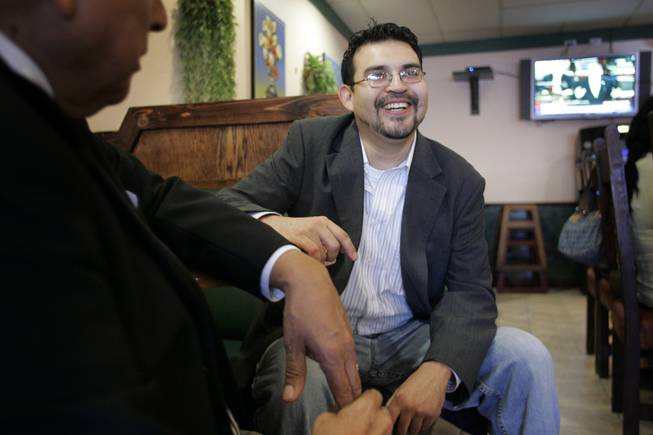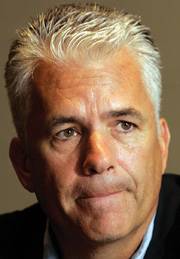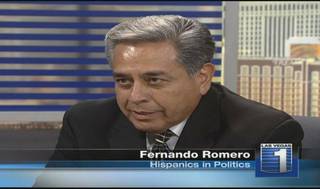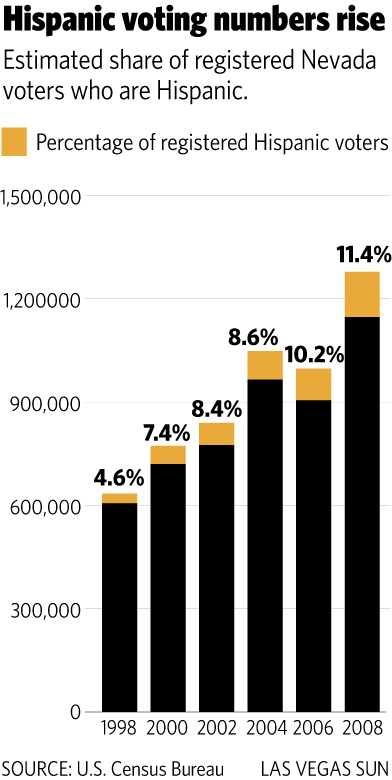
Marco Rauda, right, the Nevada director of Democracia Ahora, talks with Fernando Romero, president of Hispanics in Politics, at Esmeralda’s Cafe as they view the U.S. Senate’s vote Thursday on Judge Sonia Sotomayor’s confirmation to the Supreme Court. “This is definitely a historic moment,” Rauda said.
Friday, Aug. 7, 2009 | 2 a.m.

John Ensign

Rep. Dean Heller
Lasting Impression?

Viewing video requires the latest version of Adobe's Flash Player
Sun Archives
When Republican Sen. John Ensign announced his opposition to Supreme Court nominee Sonia Sotomayor this week, he cited disagreements with her judicial approach and his “need to protect the sanctity of our Constitution.”
It was an awkward phrase for a senator who recently admitted an affair after a career spent emphasizing the sanctity of marriage and a decade earlier called on President Bill Clinton to resign for lying about his affair with an intern.
But his position may have done real damage to the state Republican Party’s efforts to attract Hispanic voters in Nevada.
Nevada has a growing Hispanic population, a group that is increasingly moving to the Democratic names on the ballot. The Hispanic electorate nationwide is credited with giving President Barack Obama the margin he needed for victory last fall.
Like Republicans nationally, the party in Nevada has lost ground with Hispanics, and the state’s Republican elected officials in Washington are giving these voters little reason to join the party, said Andres Ramirez, a Nevadan who is vice president of Hispanic Affairs at NDN, a liberal think tank in Washington.
Voting against the first Hispanic woman’s nomination to the Supreme Court will not help.
“They have no major leader to show any indication to Hispanics they want to support them,” Ramirez said. “Obviously this is a historic vote to Hispanics. For folks to think it doesn’t matter in Nevada, they’re sorely mistaken.”
Sotomayor, the Princeton and Yale-educated daughter of Puerto Rican parents, has drawn backing from Hispanics across Nevada’s political chasms.
Support for her appointment has united those from more conservative groups including the state’s Latino Chamber of Commerce with liberal Hispanic civil rights organizations. Even the often disparate groups within the Hispanic population have set aside their differences for Sotomayor.
Ensign’s vote against Sotomayor comes as the state’s other Republican in Washington, Rep. Dean Heller, has provoked the Hispanic electorate with his views. Heller has pushed for measures to deny health care to illegal immigrants and their children and wrote legislation mandating English-only ballots.
The congressman’s moves are clearly popular in his mostly rural Northern Nevada district and among conservative voters, as anti-immigration views run strong in the state.
Yet such a hard-line approach to Hispanic issues may not play as well statewide, with Heller considering a run for the Senate against Majority Leader Harry Reid in 2010.
Ensign stepped onto the Senate floor late Tuesday to deliver a speech outlining his reasons for voting against Sotomayor. He had been one of the last senators to meet with the judge, who began visiting senators shortly after Obama nominated her to the high court two months ago.
“There is no denying Judge Sotomayor is impressive,” Ensign said in the speech. “The fact that this is a proud moment for our nation has not been lost on me.”
Yet Ensign had concerns — about her views on Second Amendment rights, about her use of international law to influence her decisions, about differences he perceived between her words and actions.
Author Jeffrey Toobin writes in “The Nine: Inside the Secret World of the Supreme Court” about the conservative backlash against justices who allow international law to seep into their opinions.
Conservatives were aghast when Justice Anthony Kennedy issued a 2004 opinion that overturned the death penalty for minors by noting that the United States stands alone among countries still allowing the punishment.
Sotomayor had been careful during her confirmation hearings to say she would not rely on foreign law. But Ensign pointed out that her written statement said, “In limited circumstances, decisions of foreign courts can be a source of ideas.”
Ensign noted in his speech that Justices John Roberts, Antonin Scalia and Clarence Thomas, the court’s conservative bloc, agree that “it is illegitimate for judges to look to foreign sources for guidance.”
Perhaps more compelling for Nevadans is Ensign’s views on Sotomayor’s approach to gun owners’ rights. Ensign called the Second Amendment a “cornerstone of the Bill of Rights.”
The senator said Sotomayor “has a bias against firearms and our constitutional right to ‘keep and bear arms.’ ”
The National Rifle Association opposed Sotomayor, saying the organization would grade senators’ performance in this session of Congress on this vote.
In Nevada, gun owners’ rights run strong, and Ensign will surely be rewarded for having opposed a nominee gun owners think will not be on their side.
But at what political price? Who has a stronger voice in the changing political landscape in Nevada these days, gun owners or the growing Hispanic electorate?
Republican Sen. John Cornyn, who is running the party’s campaign arm in the Senate for the 2010 election, downplayed the significance of the Sotomayor vote among Hispanic voters.
Cornyn represents Hispanic-heavy Texas, and he noted that many Hispanics are drawn to the Republican Party message of smaller government and conservative social values.
They are business owners concerned about taxes and Catholic families who oppose abortion.
“I think it’s myopic to look at what happened in 2008 and read too much into Republican appeal to Hispanic voters,” Cornyn said.
He thinks the economy, not the Sotomayor vote, will determine the Hispanic ballots in 2010.
“The fact that someone casts a vote because they disagree with her judicial philosophy has nothing to do with her ethnicity, so you shouldn’t read too much into that narrative that some are trying to sell,” he said.
On Thursday the 99 senators, minus ailing Democratic Sen. Edward Kennedy of Massachusetts, gathered in the chamber to cast their votes for the next Supreme Court justice.
The gallery was packed with onlookers who were reminded about the rules against shouting after the vote. One by one, senators rose to cast their ayes and nays.
Reid, who said later he was “humbled to be a witness to history,” voted yes.
Ensign, who is not up for reelection until 2012, voted no.


Join the Discussion:
Check this out for a full explanation of our conversion to the LiveFyre commenting system and instructions on how to sign up for an account.
Full comments policy